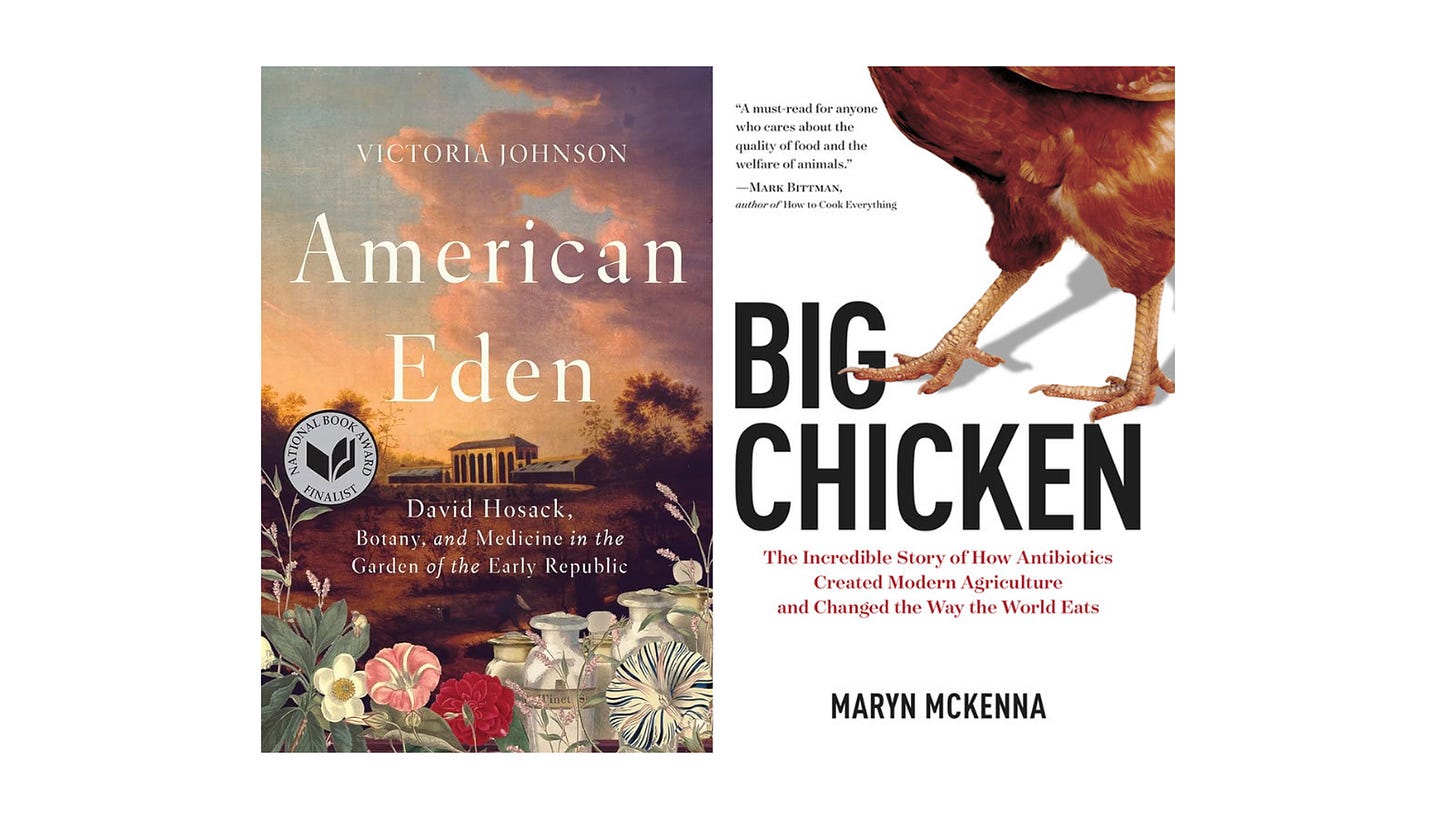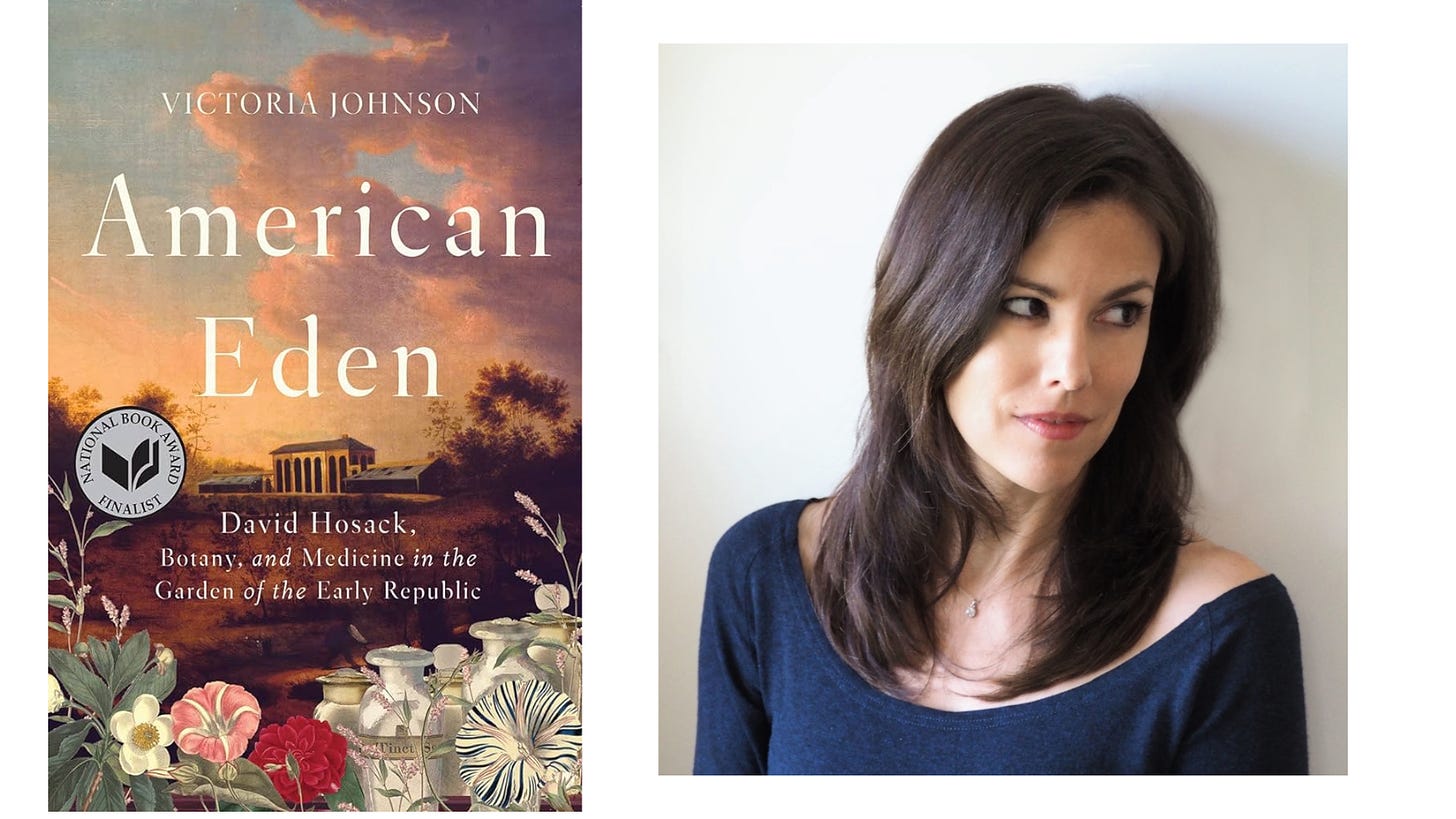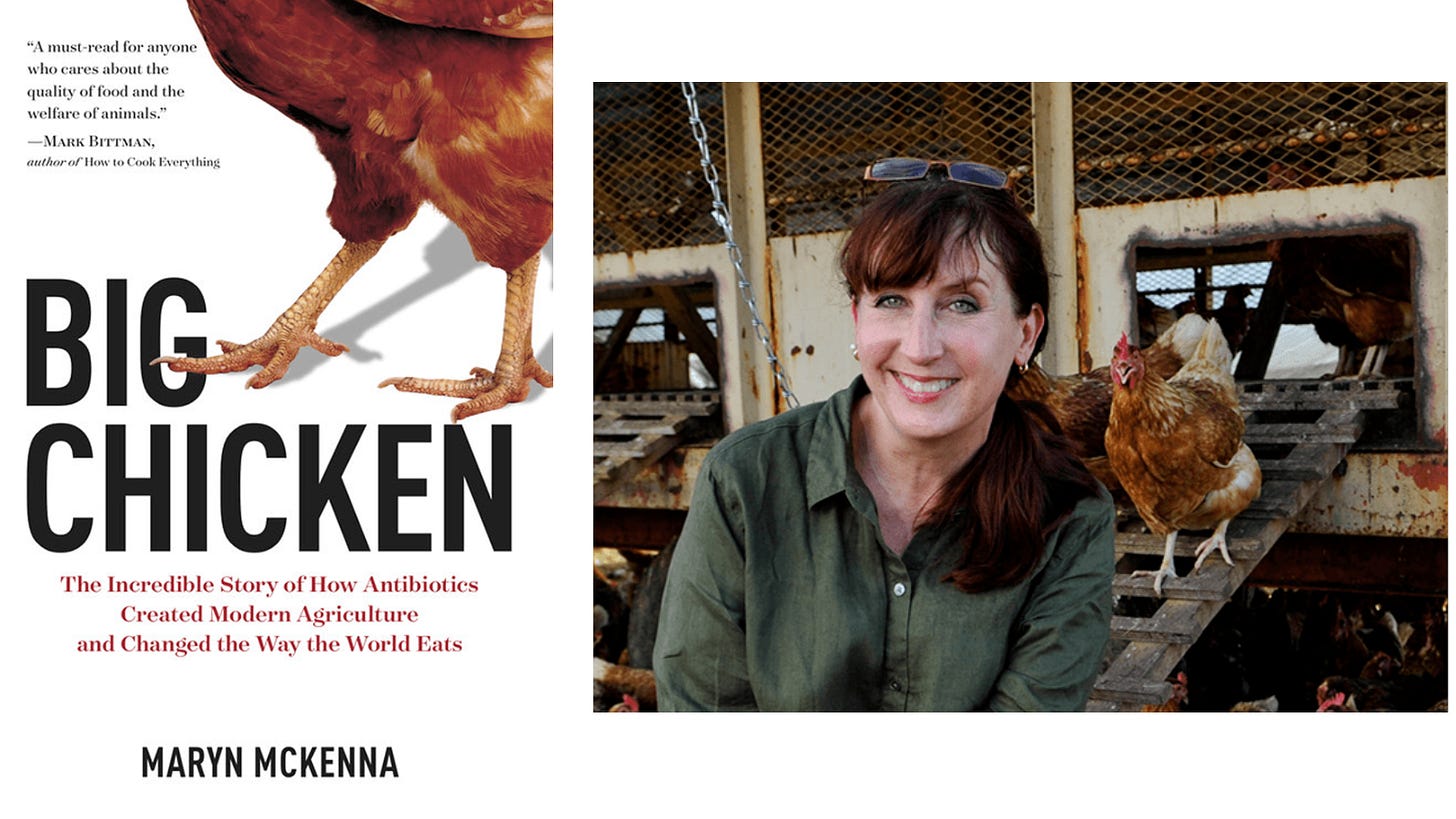Book roundup! Two of my favorite books on history and health
I've had the opportunity to meet some incredible authors on my podcast. Here are two of my favorite books they've written!
Hi there, readers! Just a quick note to let you know about two exciting opportunities. If you’re not a paid subscriber, but would like to read this post, check out the 30-day free trial offer I have currently running. After the trial, you can continue to access the full content of the newsletter for $4.17 per month, or scale back to the free version. Totally up to you ☺️
I’m also soliciting reader feedback with this short survey! Three entrants will win a free year of newsletter access, a $50 value. Thanks and happy reading!
The Foodie Pharmacology podcast covers a variety of subjects, from agriculture and gardening to the history of medicine and foodways, as well as cutting-edge science on the ethnobotany and chemistry of our favorite foods. One way I discover new guests for the show is by keeping an eye out for intriguing books in these areas. Here are two of my favorite books, both written by women I deeply admire.
Both of these are universally compelling reads, and after finishing them, you'll feel even more knowledgeable about some truly fascinating topics. If you've already read them, I'd love to hear your thoughts!
American Eden
First up is “American Eden” (Liverwright, 2018) by Victoria Johnson. This book was a Finalist for the Pulitzer Prize (History), a Finalist for the National Book Award (Nonfiction), and a A New York Times Notable Book of the Year!
Description
The untold story of Hamilton’s―and Burr’s―personal physician, whose dream to build America’s first botanical garden inspired the young Republic.
On a clear morning in July 1804, Alexander Hamilton stepped onto a boat at the edge of the Hudson River. He was bound for a New Jersey dueling ground to settle his bitter dispute with Aaron Burr. Hamilton took just two men with him: his “second” for the duel, and Dr. David Hosack.
As historian Victoria Johnson reveals in her groundbreaking biography, Hosack was one of the few points the duelists did agree on. Summoned that morning because of his role as the beloved Hamilton family doctor, he was also a close friend of Burr. A brilliant surgeon and a world-class botanist, Hosack―who until now has been lost in the fog of history―was a pioneering thinker who shaped a young nation.
Born in New York City, he was educated in Europe and returned to America inspired by his newfound knowledge. He assembled a plant collection so spectacular and diverse that it amazes botanists today, conducted some of the first pharmaceutical research in the United States, and introduced new surgeries to America. His tireless work championing public health and science earned him national fame and praise from the likes of Thomas Jefferson, James Madison, Alexander von Humboldt, and the Marquis de Lafayette.
One goal drove Hosack above all others: to build the Republic’s first botanical garden. Despite innumerable obstacles and near-constant resistance, Hosack triumphed when, by 1810, his Elgin Botanic Garden at last crowned twenty acres of Manhattan farmland. “Where others saw real estate and power, Hosack saw the landscape as a pharmacopoeia able to bring medicine into the modern age” (Eric W. Sanderson, author of Mannahatta). Today what remains of America’s first botanical garden lies in the heart of midtown, buried beneath Rockefeller Center.
Whether collecting specimens along the banks of the Hudson River, lecturing before a class of rapt medical students, or breaking the fever of a young Philip Hamilton, David Hosack was an American visionary who has been too long forgotten. Alongside other towering figures of the post-Revolutionary generation, he took the reins of a nation. In unearthing the dramatic story of his life, Johnson offers a lush depiction of the man who gave a new voice to the powers and perils of nature.
What I loved about the book
I'm a history buff, and this book catered to all my interests! It encompassed botany, medicine, the history of the early American Republic, and, of course, adventure! Just a couple of centuries ago, it was typical for medical doctors to also be skilled botanists. I thoroughly enjoyed learning about David Hosack and America's first botanical garden. Now, every time I travel to NYC and pass by Rockefeller Center, I think of his tale.
Listen to my interview with Victoria on the Foodie Pharmacology podcast.
Big Chicken
I’ve been using “Big Chicken” (National Geographic, 2017) in my Food, Health, and Society class now for several years, ever since its release. This book was Winner of the 2018 Science in Society Award. Named a Best Science Book of 2017 by Amazon, Smithsonian, and Science News; an Essential Science Read by Wired; a Best Health Book by the Toronto Globe and Mail; a Best Food Book of 2017 by Civil Eats and the Atlanta Journal-Constitution.
Description
In this eye-opening expose, acclaimed health journalist and National Geographic contributor Maryn McKenna documents how antibiotics transformed chicken from local delicacy to industrial commodity - and human health threat - uncovering the ways we can make America's favorite meat safer again.
What you eat matters—for your health, for the environment, and for future generations. In this riveting investigative narrative, McKenna dives deep into the world of modern agriculture by way of chicken: from the farm where it's raised directly to your dinner table. Consumed more than any other meat in the United States, chicken is emblematic of today's mass food-processing practices and their profound influence on our lives and health. Tracing its meteoric rise from scarce treat to ubiquitous global commodity, McKenna reveals the astounding role of antibiotics in industrial farming, documenting how and why "wonder drugs" revolutionized the way the world eats—and not necessarily for the better. Rich with scientific, historical, and cultural insights, this spellbinding cautionary tale shines a light on one of America's favorite foods—and shows us the way to safer, healthier eating for ourselves and our children.
What I loved about the book
I've long been puzzled by how and why antibiotics—life-saving medications that can lead to resistance if misused—entered our food systems. It's a remarkable tale, and Maryn masterfully interweaves the history with stories about the individuals behind it. Although I've been studying antibiotic resistance in my lab for over a decade, I still gained new insights from this book on the history of antibiotics and their impact on our food systems.
Listen to my interview with Maryn on the Foodie Pharmacology podcast.
The Takeaway
Both of these books have lots to offer! If you share my interest in how history and health intertwine, add these to your reading list this fall!
Yours in health, Dr. Quave
Cassandra L. Quave, Ph.D. is a scientist, author, speaker, podcast host, wife, mother, explorer, and professor at Emory University School of Medicine. She teaches college courses and leads a group of research scientists studying medicinal plants to find new life-saving drugs from nature. She hosts the Foodie Pharmacology podcast and writes the Nature’s Pharmacy newsletter to share the science behind natural medicines. To support her effort, consider a paid or founding subscription, with founding members receiving an autographed 1st edition hardcover copy of her book, The Plant Hunter.
Reader Survey
I'd love to learn more about what you, as readers, would like to see in future content! Three participants will be randomly selected to receive a complimentary one-year paid subscription—a $50 value! The survey will remain open until October 15th.
Available in hardcover, paperback, audio, and e-book formats! Translated editions now available in Mandarin and Japanese!








